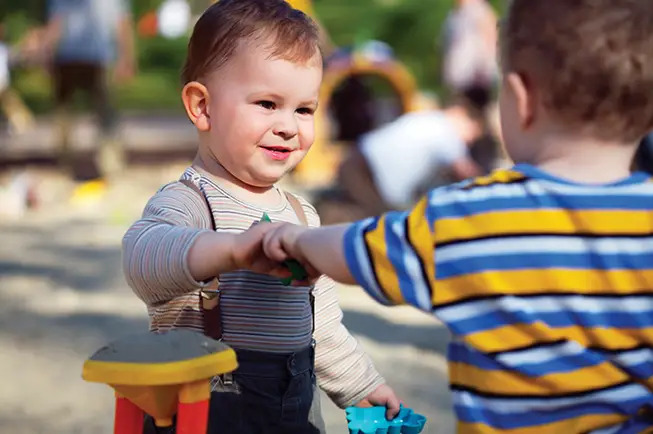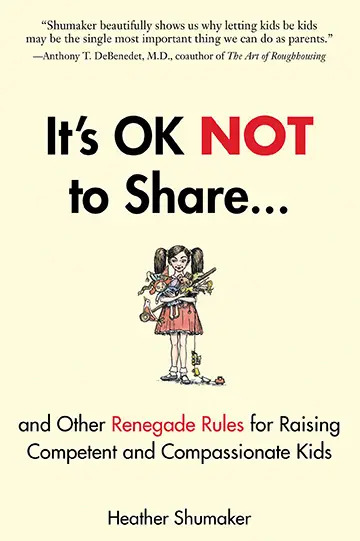Heather Shumaker, author of It’s OK NOT to Share…and Other Renegade Rules for Raising Competent and Compassionate Kids, discusses the importance of uninterrupted play for toddlers, and how the typical adult views of sharing trample kids’ right to play, as well as the benefits of renegade sharing and child-directed turn-taking.
You’re reading a magazine when suddenly someone takes it from you and starts reading the feature story. “I want it,” he says. “You’ve had it a long time.” Do you get mad?
As adults, we expect our friend to wait his turn before grabbing the magazine. We don’t like to be interrupted. When we’re done, we gladly hand it over. The same turn-taking concept should apply to young kids. A child’s turn should be over when she is “all done.”

Renegade Reason
“Sharing on demand” interrupts play, erodes parent-child trust, and teaches false generosity. Take turns instead.
Here is one of my favorite scenes of childhood: watching a 3-year-old rush up to another child and joyfully hand over a toy. Not just any toy. The same toy these two kids were competing over a few short minutes ago. The same toy this 3-year-old had clutched to his chest and refused to be parted from. What’s more, the toy is offered up without any parental prompting. Suddenly everyone is all smiles.
Fantasy? I see it happen all the time. By protecting your child’s right to play with a toy until he is all done, by building trust together so your child knows he can count on you to protect his rights, and by coaching him to tell the other child when he’s all done, you can witness this joyous scene of true generosity.
Almost any young child can do it. Why not yours?
Why It Works
You can wish your 2-year-old could share, but developmentally, she’s not ready. Sharing comes in stages. Young kids can be trained to give up a toy on command to please an adult, but experts on children’s moral development, including William Damon, Ph.D., say a notion of true, altruistic sharing doesn’t begin until elementary-school age. Children younger than 5 share sometimes, most often to get something they want.
Teaching delayed-gratification skills, on the other hand, can do your child good. Impulse control (waiting for a toy and not grabbing) is a vital part of brain development and can be strengthened through practice. Impulse control is part of what’s termed “executive function.” Research by neuroscientist Adele Diamond, Ph.D., FRSC, examines executive function (impulse control, memory, adaptability, problem-solving, reasoning, and other skills) in young children and shows how strong executive function can lead to later academic success.
Child development experts, including Dorothy Briggs (author of Your Child’s Self-Esteem), say young kids need to experience “owning” before they can share. Ownership is not legal ownership. It could mean owning a stick or a pinecone found at the park. Ownership to a child is control over an object. This means he’s using it, and he’s the boss. He gets to hold it and decide who else can touch it. As early-childhood expert Eda LeShan writes, “Teaching young children to be generous starts with allowing them to be selfish.”
Studies by child development experts such as Nancy Eisenberg, Ph.D., and others show that adult insistence on sharing has little effect. What’s more, true generosity is slower to develop in children who are forced to share on demand. Kids will often get sneaky, share only to please an adult, and never share if an adult isn’t watching. True generosity, however, can be habit-forming. The glow of generosity comes in part because the brain releases neurotransmitters, reinforcing the “reward circuitry” in kids’ brains.
Taking Off Your Adult Lenses
Keeping a toy when another child wants it is not the mark of a selfish child, but simply a busy one. Protect your child’s right to play and teach her to say, “I’m not done yet.” Interrupting play—and instantly rewarding the other child—does not benefit either child. Waiting for a turn teaches great lessons in delayed gratification. Young children aren’t ready to share; they are ready to take turns. Turn-taking empowers kids and helps teach courtesy, awareness, and spontaneous generosity.
We expect young children to share their toys. We expect them to be “nice.” But typical adult views of sharing trample kids’ right to play and teach them the wrong lessons.
Here’s a typical example: Max is playing with a truck. Hayden comes up and reaches for it. Both kids are 3.
Max: Hey! That’s mine!
Hayden: I need it!
Max: I had it first! I’m playing with it!
Hayden: (Crying) He’s not sharing.
Max’s mom: Max, be nice. Remember, we have to share. Hayden hasn’t played with it yet. If you can’t share your toys, I’ll have to put the truck away.
Hayden gets the truck. Max cries and sulks.
The preschool years are summed up best by the image of two kids tussling over the same toy. “I had it!—I want it!—No, mine!” When that happens, we expect young kids to do what we should not do ourselves: passively give up and hand over the object to the aggressor.
What’s more, we often pressure and scold our own kid, saying, “Be nice and share. Let Hayden play with it now.” We are embarrassed when our child won’t share. Our instinct is to give in instantly, as soon as someone asks.
It’s easy to sacrifice our own kids in favor of others. We all want our kids to be liked. We try to teach them to be kind and generous people. Too often, however, forced sharing, or sharing on demand, backfires. Here’s why.
A child like Max learns:
- People get what they want in life by grabbing.
- In social situations I can’t count on my mother to protect me.
- My mother likes the other child better.
- My own play is unimportant.
- Sharing means giving up something I like.
- Sharing makes me feel bad and mad.
- I won’t share unless I have to.
Sharing on demand hurts both kids. What did Hayden learn? A child like Hayden learns:
- I get what I want in life by grabbing and whining.
- If I demand I shall receive.
- What I want right now is more important than anyone else’s rights or feelings.
- Being loud, fast, and persistent wears other people down.
- Adults will take my side if I use the word “sharing.”
- I need adults to get what I want.
What should be more important here is protecting Max’s right to uninterrupted play. Let Max keep the truck. He is busily engaged and his play is important. It doesn’t matter if he has a long turn with a toy and Hayden is kept waiting. Delaying gratification teaches a far more valuable life lesson than giving in to demands. The key to taking turns is making it happen on the child’s schedule. His turn is done when he is all done with the toy.
Sharing can be a confusing topic for adults because we mix up the right to property (“It’s mine!”) with the right to play (the child is busy). This is especially strong, since American culture gives so much weight to individual property and what ‘belongs’ to whom. But turn-taking is not really about property at all. It’s about learning social awareness and protecting precious playtime.
Consider this. What if someone says, “Hey! Can I use your car? Can I borrow your purse?” We want to trust somebody before lending them our car. Some items are very personal: a purse or wallet to an adult, a blankie or favorite toy to a child. Sharing is a social choice. For true generosity, sharing should be built on trust and infused with the warmth of giving.
As adults, we don’t share things with people we don’t trust; don’t share things that are personal or valuable; don’t readily share things until we are finished using them.
And if we do, we don’t feel good about it. We feel pressured and worried. If we give something up, we do it just to please. Yet we expect young children—who have fewer social skills than we do—to share on demand. “Sharing is a desired behavior in our society,” says Jan Waters of the School for Young Children in Columbus, OH. “But it’s fruitless to force it at the preschool level.”
Being All Done
Being all done may take seconds or hours. The key is that the child herself decides. Her play is done when she decides she is done. Don’t think about the clock. Young kids don’t have a concept of time. Saying “Five more minutes, then the doll goes to Katie” is confusing to kids and puts unnecessary pressure on their play. When a child keeps a toy until she is truly finished, she willingly hands the toy over to the waiting child.
Of course, play needs to be interrupted many times a day for necessary events, such as meals and outings. There may be times when waiting for your child to be all done just isn’t feasible. This makes uninterrupted playtime even more vital. Not sure if a child’s done yet? Ask him.
Here’s what turn-taking looks like. This example shows an adult helping young kids learn the method.
Joey and Danny (both age 3) want the same airplane. Joey had it first. Danny grabs the airplane.
Joey: Hey!
Mom: Danny, I see Joey has the airplane right now. He’s using it. I can’t let you take it from his hands. Can you give it back, or do I need to help you? (Mother returns toy to Joey.) Let’s ask Joey if he’s finished yet. Joey, are you finished with the airplane?
Joey: No.
Mom: Will you let Danny know when you’re all done?
Joey nods. Danny cries and grabs for the toy.
Mom: That makes you mad. You want it right now. It’s so hard to wait.
Mom helps Danny move away and holds him.
Sharing for adults is about trust, friendship, and generosity. All these take time to nurture. Sharing for kids centers around possessing and controlling. A young child can learn lessons of trust and generosity best when she is allowed to hold on to an object until she is fully done using it.
Direct Communication Skills
Child-directed turn-taking packs some powerful life lessons. It forces kids to confront one another directly. Communicating differences with a peer is a huge social step for young kids, and truly, for a person of any age. How many of us parents have the courage to speak up, confront someone directly, and clearly communicate our needs? William Ury, coauthor of Getting to Yes and author of The Power of a Positive No, coaches adults to say no gracefully and set limits on others. Your preschooler can learn that. Setting healthy habits of positive assertiveness will be a life blessing.
This puts the kid who won’t share in a different light: It’s good and healthy when she protests when asked to give up a toy. It shows she’s busily engaged and can’t be bullied by another kid. Here’s an example of a confident 4-year-old who can stand up for herself and her right to play. The second 4-year-old also shows emotional maturity when he doesn’t get what he wants right away.
Four-year-old Tess is playing with a flashlight. Aiden grabs it from her.
Tess: Stop! Don’t take my laser out of my hand!
Aiden: I want it!
Tess: I’m not done yet.
Aiden: Oh, man! I need a laser, too! (Hands it back.)
Tess: Well, you know, there’s a list for it. I don’t want you to steal it.
Aiden: (Looks at the list and adds his name after Sarah’s.) I’m waiting for the list.
Five minutes later, Tess puts the flashlight down.
Tess: I’m all done!
Aiden: Who’s next on the list? (Hands the flashlight to Sarah.)
A friend of mine couldn’t believe this scenario happened. “It unfolded too easily,” she protested. Tess and Aiden are real kids. Just 4 years old. They managed this conflict seamlessly because they had confidence and practice with a fair turn-taking system. Your family can adopt this system, too.
Benefits of Renegade Sharing
Giving up something feels good, and true generosity develops with joy. Play continues uninterrupted. Learning follows to its natural conclusion. The system is fair and easy to understand. There is less stress on parents. Kids get practice setting limits on other kids, and they gain enhanced awareness of others.
The inherent lessons for the children are many: great lessons in courtesy (telling someone when you’re done), direct communication with peers, delayed gratification, and impulse control. Kids learn concepts of sequence (your turn, then his turn, then my turn), and they practice handling tough emotions (it’s hard to wait). They get early experiences of ownership and power.
And one of the enduring benefits that we all strive for? Independence—your child’s ability to deal with sharing situations without an adult present. Imagine that—and then, make it reality.
 |
Excerpted from It’s OK NOT to Share…and Other Renegade Rules for Raising Competent and Compassionate Kids by Heather Shumaker with the permission of Tarcher/Penguin. Copyright 2012 by Heather Shumaker. |





















